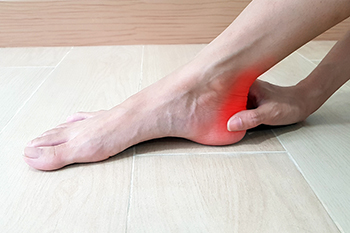
The Achilles tendon is defined as the tendon in the calf which connects the calf muscles to the heel. People who frequently participate in sporting activities may experience an Achilles tendon injury, and this can be common among runners. It is considered to be the strongest tendon in the body, and can become painful if an injury has occurred. Some of the symptoms that patients may have can include severe heel pain, the affected area can be tender when touched, and the back of the ankle may be swollen. If the Achilles tendon is affected during a foot injury, the patient may hear a popping sound at the time of the mishap, and there is often immediate pain. This tendon can become weakened from overuse, and this may be a result of repeated stress that happens gradually. Additionally, this type of injury may occur from wearing shoes that do not fit correctly, and increasing the intensity and speed of the chosen exercise too soon. If you have endured an Achilles tendon injury, it is strongly advised that you are under the care of a podiatrist who can diagnose it correctly, and offer prompt treatment.
Achilles tendon injuries need immediate attention to avoid future complications. If you have any concerns, contact one of our podiatrists of Lovely Foot Associates, PC. Our doctors can provide the care you need to keep you pain-free and on your feet.
What Is the Achilles Tendon?
The Achilles tendon is a tendon that connects the lower leg muscles and calf to the heel of the foot. It is the strongest tendon in the human body and is essential for making movement possible. Because this tendon is such an integral part of the body, any injuries to it can create immense difficulties and should immediately be presented to a doctor.
What Are the Symptoms of an Achilles Tendon Injury?
There are various types of injuries that can affect the Achilles tendon. The two most common injuries are Achilles tendinitis and ruptures of the tendon.
Achilles Tendinitis Symptoms
Rupture Symptoms
Treatment and Prevention
Achilles tendon injuries are diagnosed by a thorough physical evaluation, which can include an MRI. Treatment involves rest, physical therapy, and in some cases, surgery. However, various preventative measures can be taken to avoid these injuries, such as:
If you have any questions please feel free to contact our office located in Johnstown, PA . We offer the newest diagnostic tools and technology to treat your foot and ankle needs.